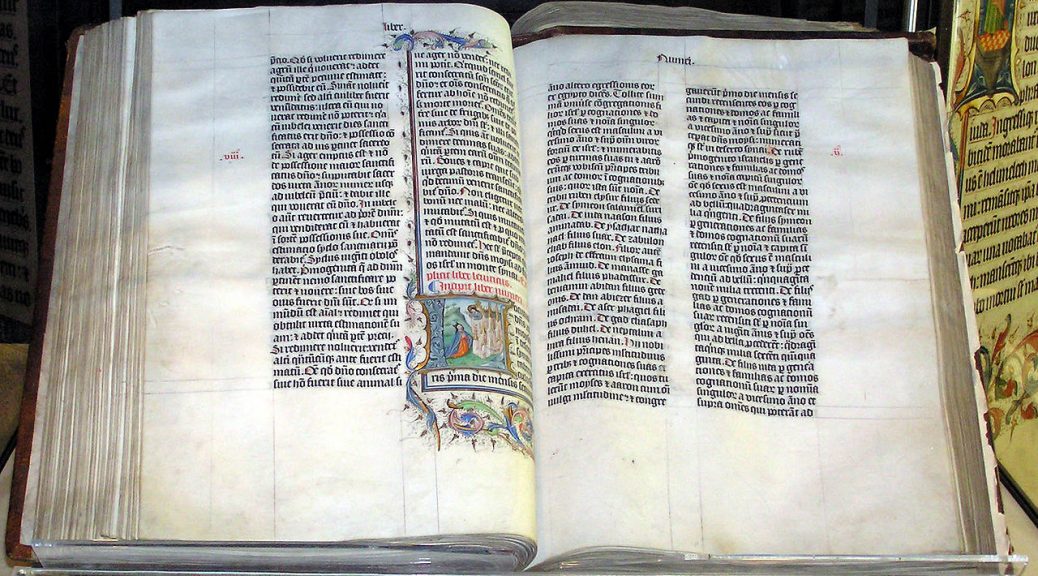A Sermon by the Rev. Dr. Arthur M. Suggs
on the Second Sunday of Lent, February 25, 2018
This is the second in the series of sermons on The Good Book.
“This is my second sermon in a series about the Bible, and today I want to look at both the use and the abuse of the Bible.”
“Early in my first pastorate, I had a best friend by the name of Greg. He was a member of my church, down in Pennsylvania, and we had a lot in common. Our wives and children were friends with each other, and he was what I would call a righteous man. He did well by his family, his business, his community, and his church.”
Greg’s home was on a hill, and it had a bay window with a view that overlooked the valley from an overstuffed chair. Given to being very devout, there he sat with his well-worn Bible as well as probably two dozen Christian books. He would spend at least half an hour every day there with his morning devotions.
During our friendship, we had dozens or perhaps a hundred, theological conversations. He was raised Catholic but sort of gave up on the strictures of that faith, moved toward Lutheranism, and later, when our paths crossed, he was Presbyterian. Finally, he went toward an independent Evangelical church.
While I knew Greg, he was diagnosed with thyroid cancer. There are four variations of that disease, and his was one of the bad ones among those that eventually get you. We remained friends for many years, but the time finally came for Tracy and me to leave that little town and go to the big city of Binghamton.”
 “Here, I was handed a copy of Book I of Conversations with God, and it rocked my theological world. I was never the same after having read that book, and so I was anxious to give my friend a copy of it.”
“Here, I was handed a copy of Book I of Conversations with God, and it rocked my theological world. I was never the same after having read that book, and so I was anxious to give my friend a copy of it.”
He Gave Me a Sucker Punch and Shot Back at Me: “Well, What About John 3: 16?”
“A couple years passed, and finally we went back to his house for a visit, and I gave him a copy. About a month later, when we were together again, he was not amused about the book. Evangelical Christians have a big problem with Conversations with God and A Course in Miracles and virtually all literature of that genre.”
“Using two phrases, Greg accused me first of apostasy, a technical term meaning standing away from the faith, having left the faith, and that wasn’t enough. He also accused me of being a worshiper of Satan. That was a sucker punch to our friendship. It was hard to be friends after that.”
“More years passed with very little conversation, little contact. However, our wives were still friends, and our kids were still friends with his kids, and so the day arrived when we were down there visiting again. My relationship with him was pretty chilly, but we found ourselves in his living room alone for a moment, and he began the conversation with this question, “Art, are you still preaching a false gospel?”
“At that point, there’s not much left of the friendship, and there’s nothing left to lose, so I replied, “Well, I suppose so.””
“Then we entered into yet one more theological discussion. Let me tell you a little about that because he was an avid believer in the standard doctrine that we’re all miserable sinners, we’re all doomed to hell, and Jesus, by dying on the cross, is our redemption. God accepts that 100 percent perfect sacrifice on our behalf. By believing in that, we are covered, and we’re allowed into heaven after all.”
“I admitted to Greg that I see that doctrine in the writings of Paul, for example, in the Book of Romans and the Book of Galations. I see that, I don’t argue with it. I don’t subscribe to it, I don’t believe it, but I see that it’s there in the writings of Paul.”
“However, I also remarked, I don’t see it in the Gospels. I see lots of spiritual teaching in the gospels, the Parables and so forth, but I don’t see that program of redemption, that system of substitutionary atonement leading to salvation in the Gospels.”
“He shot back at me like he was prepared for me to say that, and now he’s going to tell me the truth, so he shot back at me and asked, “What about John 3: 16?”
I Want to Look at Use and Abuse of the Bible.
Featured Image Credit: A Bible handwritten in Latin, on display in Malmesbury Abbey, Wiltshire, England. The Bible was written in Belgium in 1407 AD, for reading aloud in a monastery. Photo by Adrian Pingstone. PD Wikimedia.

